Neuro-divergence
We all have natural human variations, most of which are not a pathology or disorder, with some degree of
neuro-divergent, non-neurotypical ways of living outside of accepted ideas of conforming to normality
within a range of traits, strengths & weaknesses. (See also Divulging the content of our work together to third parties)
London Counselling For Dyslexia, Dyspraxia, ADHD, Autism
In This Section:
- Neuro-Diversity, Diagnosis
- Dyslexia Counselling - Specific Dyslexia Experiences
- Dyslexia & Dyspraxia - Overlapping Experiences Of Being Dyslexic & Dyspraxic
- What Counselling For Dyslexia, Counselling For Dyspraxia Offers
- Dyspraxia Counselling, DCD Therapy - Specific Dyspraxia Experiences
- Counselling For ADHD, Counselling For ADD - Familiar Experiences
- Autism Counselling, Autistic Therapy
- Questions About Dyslexia, Dyspraxia, ADHD, Autism
Neuro-Diversity, Diagnosis

Neuro-Diverse Experiences, "Labels" The highly susceptible brain organ can be changed when reacting to stressful situations (including parental stresses), experiences, impact of traumas by tuning out as a response (especially if highly sensitive to the environment). Some of us, for example, may have tuned out as child, including tuning out of our feelings, needs, and this can continue into adulthood. Our brain is also affected by the impact of our past (including any non-responsiveness, empathic breaks and frustrations in our early life - see also Our First Relationship - Early Connections & Bonding Patterns), social, life factors which also shape our self, as do the anchors in our life. However, a lens to view certain conditions is through what's happening biomedically in the brain and the make-up of neuro-diversity (see also Free Will & Relationship To Fatalism, Preordainment, Determinism, Indeterminism & Randomness, Karma, Nature & Nurture - Dilemmas, Challenges). For some of us, since birth our brains (although significantly shaped and influenced by our environment, as neuroscience acknowledges) may be wired differently. Our receptors and transmitters may also be different. (As parents, we may sometimes notice our own neuro-diversity through similar characteristics in our own child.) The following neuro-divergent experiences, neuro-original ways of being, ranging from mild to substantial can occur singularly or in various combinations: dyslexia, dyspraxia, dyscalculia, ADHD/ADD. We may be a person experiencing autism or be given a "label" of "high functioning ASD" and find some things difficult to navigate. These "labels", "conditions" (also known as Autism - Autistic Spectrum Disorder, sometimes still called Asperger's syndrome, where our logical, rational side can dominate, may also be linked to alexithymia - trouble finding words to express feelings or struggling with our own emotional awareness or emotions in others (or what has been termed Pathological Demand Avoidance - PDA) may carry interchangeable, coexisting responses, "symptoms". We are not a set of deficits. The term "disorder" can indicate that there is something wrong, rather than a natural variation in human evolution, simply different. (Sometimes we just may be highly sensitive and not have these so called neuro-divergent "conditions", "labels". For others these "conditions" may coexist, where we can also be sensitive to high stimulation and how we process our sensitivities may be different.) The role of therapy is not to focus on the diagnosis, "cure" "conditions", but more to work with our individual needs and own potential, so we are comfortable with our Self and others.
Perceived Advantages Of Receiving, Having A Diagnosis Or Label For some of us it can be freeing to be given a diagnosis, have a label. It can help explain why we have felt the way we felt, giving us understanding how to manage challenges. We may be able to access other resources and, for employers, to support us, make reasonable adjustments.
Perceived Disadvantages Of Receiving, Having A Diagnosis Or Label Some of us may not want to receive a diagnosis or label, because it may stigmatise us, or we fear others' assumptions, judgements (maybe even our own). Disclosing any diagnosis is in our hand.

These neurological developmental differences impact on how we connect with our thinking brain, how we learn and process information, affecting our senses (maybe experiencing heightened responses in our brain to sensory information), body, feelings, mind, ways of being in the world, different to the typical majority. And we may therefore be hard to be understood by others - even those close to us. Lost or stuck at times it can be as if we are in a maze and the lights go off. The impact of some of our differences may be anxiety provoking, placing our nervous system on a constant state of alert, which can be exhausting. These neuro-divergent differences (for some) may include how we process change, socially interact (we may experience a sense of not quite fitting in). Strengths and qualities of neuro-diversity can include originality, visual thinking, creativity, original ideas and thinking, exceptional abilities, determination, strategic thinking, focus and our unique contribution to our neuro original way of being in the world impacting on our personal and professional life. Each person's neuro-diversity manifests differently with some common threads.

Assessment, Diagnosis for Dyslexia, Dyspraxia, Dyscalculia, ADHD/ADD, Autistic Spectrum Disorder (ASD) Whether to get a diagnosis for Neuro-Divergent "Conditions" may need to be thought through, discussed. (We can also be mis-diagnosed for ADHD or being autistic, when in fact we are just highly sensitive.) Diagnosis for some can make sense, turn a light on, as if it clicks, give us an improved sense of identity, bring some clarity, understanding, relief, a psychological release, hope, help us understand without blame what we have been experiencing – that although certain things may be challenging for us, our symptoms are not the result of personal weakness or character flaw, that there is nothing wrong with us, we can achieve success through exploring, utilising our strengths, that it's OK to be different. Having this "label" can be empowering. Diagnosis with a "label", "condition" for others can initially bring us regrets for our life so far, as we reflect back on what's been missed, and the diagnosis may be overwhelming, further stigmatise us if we view it as a "label" put on us. And having "labels" can limit us, yet also tell us something. After the assessment, we may be given very practical advice, suggested skills training, technology options, and may benefit from counselling for the effects for our diagnosis and the emotional impact. (Some of us may be assessed as co-morbidity - the presence of one or more additional "labels", "conditions", with one of them being more prevalent.) Our "label / condition" may manifest in our life, but they are not our self, our essence (see also Identifying, Disidentifying & Integrating All Aspects Of Us). Some may feel alienated at time, lose touch with the people we care about, who care for us, yet need our own space, balance (yet balance for us may be very different for those who are neurotypical).

Emotional Sensitivity, Sensory Overload Because our brains are wired differently, our response, reactions to our highly tuned senses may also be different to "neurotypical" people. Some of us may not be emotionally sensitive, intuitive whereas others can be very sensitive and intuitive, and this can help guide us to be in tune with our own and other people's emotions and have meaningful relationships. We may be more emotionally sensitive than others, yet our very sensitivity and senses may overload or distracts us at times - it can be exhausting (e.g. visual perception and images and the connections we make in our head, sounds, sensitivity to background noise (where ear loops can help) and activity in particular affecting our ability to concentrate, hear what's being said, where we can be accused of not listening because we are zoned out or walk away, give little eye contact, when in fact we aren't being rude - we are just finding things too much, more than one person speaking at a time, reading, and listening at the same time, writing and listening simultaneously). When overwhelmed, we may struggle how to listen, filter and utilise information. Face to face contact over long periods may stress us out and when relating with others, some may struggle with emotional control, feel frustrated. And we may be given descriptions like "difficult", "too direct", "straight talking" or "having behavioural problems", yet it may be that we are struggling at times in a neuro-typical world. We may be over or under sensitive to what we see, absorb, temperature changes, lights, strong smells (e.g. overpowering cooking smells), a wide range of foods (maybe with unusual eating habits, or certain food textures affecting us), touch (we may feel temperature changes more than others, experience physical contact and intimate touching as uncomfortable) and textures with an aversion to certain fabrics, very tight or loose clothing. (Some of us may make repetitive movements, sounds.) We may have little sense of time, speed, distance, weight (see also Counselling For HSP - Highly Sensitive People (HSP) - Sensory Overload, What We May Be Experiencing Inside). Our sense of direction and map reading skills may not come easy to us. Awareness of our physical position and spatial relationship with others may not be finely tuned. Some of us may struggle with cooking, driving, others relating, communicating with people. We may avoid certain sensory experiences because of our sensory distress. Yet when we are sensory-seeking, these senses can bring us sensory joy, maybe sensations which preoccupy or soothe us. Whatever our "label", it can be helpful for some of us to let those close to us - a partner, friends - what we're experiencing, our inner world, what helps, what doesn't, sharing our personal stories and encouraging others to express their feelings and needs (especially if we are sensitive to rejection).
Dyslexia Counselling - Specific Dyslexia Experiences

Dyslexia Help - How We Experience Dyslexia & Behavioural Effects We may have a short attention span and time management may be challenging for us. We may find it hard to link things, to build a picture, make sense of things. Struggling to absorb, process, recall or retrieve certain information, we may have problems connecting things up with anything that has a sequence, remembering what we need to remember - especially instructions, directions (we may have a memory like a sieve), organising things, contributing to discussions, communicating our ideas, feelings. And of our memory, we can forget words or watch the whole film and forget its entirety the following day. So called straight-forward tasks may baffle us. When there is no familiarity, order or patterns, things may appear disorganised. We may find it difficult to trust, accept and manage change, step outside our comfort zone, because it may threaten our sense of safety (especially if we base it externally). In reaction, we may have become rigid or inflexible, habitually trying to find the easiest path, tending to stick to familiar safe routines. We may struggle with the unexpected, switching tasks or find it difficult to consider other ways of doing things, others' points of view. In order to compensate for our dyslexia, we may (often unconsciously) have found mechanisms for skirting around, avoiding things, work doubly hard or continuously check up on things, which can be anxiety provoking and tiring through our compensatory efforts. Our mind may often go blank (and we may have a tendency to daydream). We may have specific dyslexia problems with literacy (e.g. reading slowly, words may appear jumbled, our spelling may be erratic, we may lose our place, we may hear sounds to words that don't relate to the spelling). Numbers may be confusing. Managing our time, completing things & procrastination may be associated concerns (see also Frozen In Time, Locked, Trapped, Fixated Only In The Present Moment, Accompanying Ourselves "In The Moment" With Awareness, Presence, Imagination, Reflection). When with others, we may just not understand how they are with their emotions. Taking control of these areas may be important for us.
What May Be Happening Inside Our Head, Body Dyslexia, and indeed autism at times, can be experienced in different forms, affecting our sense of self muddled or scattered thoughts, beliefs about ourself and the world. Stuck in our head at times we may struggle to remember the order of things or communicate our ideas, because we don't see things from others' points of view. This may also affect speaking in public. With dyslexia (and dyspraxia), things can seem unstructured, disordered, not make sense at times (as if the pathways in our brain are different), which may affect us finding the right words at times. And the way we think, learn, our train of thoughts, may be different, maybe with a short attention span, struggle to concentrate. With certain tasks, that others seem to find simple or routine, we may become disorganised, easily overwhelmed, confused (compounded by our overwhelming thinking). Our brain can feel like it's short circuiting when over-stimulated by the mental pressure. We can implode (or explode), become easily tired, exhausted at times - collapse when things fall apart. It can be as if there are many loose ends and holding them all together can be draining. In our dyslexic (or autistic) world, we may feel lost or stuck inside, frustrated and tense, maybe living only half a life. This may affect our demeanour (as if not knowing what to do with our body) and how we may struggle with anchoring ourself, connecting to our centre, being in our body. Experiences in the past can continue to be held in the memory and body as trauma, unless addressed, released, responded to differently now. (See also Physical Feelings, Somatic Reactions, Other Reactions)
Creativity can solve almost any problem. The creative act, the defeat of habit by originality, overcomes everything.George Lois

Dyslexia Counselling London - How We Best Learn Symptoms of dyslexia in adults vary from person to person, as indicated by a dyslexia assessment and how we best respond to our dyslexia is very individual. If we are dyslexic, traditional teaching & learning methods may not always help us. The dyslexia counselling explores getting to know our individual learning style and how we pay attention to the connections we make, mentalise. Some of us may favour an auditory way of learning through sounds, others a visual (images, pictures) or kinaesthetic (active learning, doing, touching, practising things & moving our body). By now we may be seeking dyslexia help, dyslexia support or emotional support for dyslexia.

Taking Charge Of Our Dyslexia We may no longer want to be passive by allowing the environment to control us. Understanding, making sense & meaning of things, having some sense of order can bring about emotional relief. We may want to come to terms with adult dyslexia (and any frustrations, anger we feel), to learn any dyslexia coping strategies that support us, proactively take care of our own needs. Dyslexia therapy is different to dyslexia treatment. The dyslexia therapy offers psychological and emotional support for dyslexia, exploring ways of not only managing dyslexia, our stress, fears, anxiety, panics, any disorganisation, but also exploring other possible ways and strategies of not just coping with dyslexia but thriving, so we don't necessarily have to swim against the tide which tends to drain our energy. Dyslexia counselling & dyslexia therapy can offer individually tailored dyslexia support, so we can harness our resources, unique key strengths, the way we think, discern things, the way we think. The dyslexia counselling may therefore creatively look at what compensatory strategies, structures we can put in place that specifically work for us, what helps, what doesn't, what we may need to let go of, change, how we can override self-doubt, move out of our comfort zone, take risks. Our resilience, boundaries (see also Emotional Resilience, Emotional Strength, Emotional Stability & Being Powerful) can also support us in adapting to & proactively managing our dyslexia in ways we can be present, in the moment.
It is more common than you can imagine. You are not alone. And while you will have this the rest of your life,Steven Spielberg
you can dart between the raindrops to get where you want to go and it will not hold you back.
Recognising, Acknowledging Our Strengths - What We Are Good At Counselling for dyslexia includes supporting our strengths. These may be our ability to see a big picture, have special interests, lateral or critical thinking, being observant, communicative, have strong reasoning skills with oral comprehension, be good at solving puzzles, be logical, persistent, innovative, intuitive, imaginative, creative, empathic.
Dyslexia & Dyspraxia - Overlapping Experiences Of Being Dyslexic & Dyspraxic
Dyslexia & Dyspraxia - Counselling For Our Specific Range Of Challenges It isn't always simple to distinguish the differences between what is dyslexia and what is dyspraxia (or autism) and many characteristics are frequently experienced together. There is an innate part of us not subject to "cure" where understanding our neuro-divergent ways, utilising our unique pattern of challenges, strengths and gifts may be important to us. We may want to receive support in accommodating our differences – exploring creative practical strategies which work for us without fitting in to an imagined "society ideal". Understanding the nature of our unique difficulties, alongside our signature strengths, e.g. thinking outside the box, creativity, risk taking, eye for detail can bring a sense of relief and it may also be important to address the emotional and social aspects of our life, which the dyslexia counselling, dyspraxia counselling can explore.
Being With A Person Who Is Dyslexic, Dyspraxic When we know, live with someone who is dyslexic, it can be baffling, bewildering, maybe annoying at times, resenting some of their ways, social manner. We may view them as difficult, lazy. Tensions or resentments can build up. However if we research and try to understand with compassion the inner world of someone with dyslexia, dyspraxia, their struggles, anxieties, this can be so beneficial for both parties. It can be insightful to understand certain aspects of a person, who is dyslexic, dyspraxic. Alongside their gifts, it may be helpful to understand their life challenges, difficulties learning certain things that come easier to neurotypical people, e.g. organisational skills, planning, concentration when there are distractions or possible communication barriers, emotional frustrations. Honouring our own needs and boundaries, it may help us and them to find out what works best, e.g. asking them what kind of things feel helpful, using voice messages when possible, letting them know we have moved things to different place, if they struggle with memory retention, reminding them our special dates.

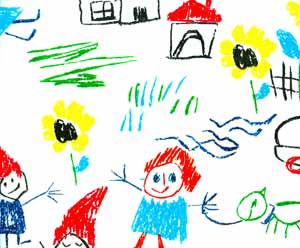
Childhood And Ongoing Experience of Dyslexia, Dyspraxia (maybe ADHD, Autism) The world may have been fun, safe, predictable until events related to our dyslexia, dyspraxia (or our ADHD, any autistic ways) affected us (and we may have since struggled to grow up). Struggling to instinctively learn the social rules, we may have experienced a sense of difference, restlessness, incoherence, exclusion, isolation, confusion, bewilderment in earlier life when we weren't doing things, learning things the way everyone else could, as if we were frequently doing something wrong. At some point we may have fallen behind our education. (As children, we may have experienced selective mutism, which we carry on now into adulthood.) High achieving schools or those with standardised, neurotypical teaching, can sideline us, compounded if there is class streaming, where we can end up feeling like the remedial child. (It could be important to remind ourself that being bright and being academic aren't the same things. We may have had special lessons, been separated from others, felt alienated, different, on the sidelines, needing to understand what was going on. Puzzled how to fit in (adolescence can present a particularly challenging time), we may have felt on the edge, confused with what "appropriate" - even affecting us now. And we may also have wanted to avoid judgement, bullying, so tended to socially mask things. Back then and now we have put in long hours to catch up with what others seemed to do easier. Both then and now - feeling put on the spot to come up with an instant answer, make a decision, can render our mind going blank, become anxious, feel panicked. Not quite getting certain things, we may have scared ourselves (and continue to do this now). We may be used to processing things intellectually, bypassing our instinctive feelings, intuition. Experiences, memories of past struggles, traumas, wounds may still affect us now. Some may have been given labels, such as a bit odd, lazy, stupid, awkward, strange (affecting our anxiety, confidence and esteem, loneliness or depression). There may have been a focus on weakness rather than our strengths. Boxed in at times, we may have been excluded from our peer group, felt humiliated, shamed, taking criticism to heart, and can still be affected now. Some may have struggled with making friends - connecting with them in their neurotypical ways, which may be unfamiliar to us. (We may sometime get lost with empathy.) Some may have experienced bullying for something obscure or because we are different. Others (often to block things out) may become obsessed with very specific interests, repetitive thoughts, sentences and go off in our head, overthinking, have a sense of floating around, struggling to be present, in the moment. Feeling betwixt and between, as if other people seem to "get" things, we may become tongue-tied, inhibit our passion, assertiveness, become self-critical. Back then and now, we may struggle to focus, concentrate for long, daydream, have a fear of being, going mad or live from a "don't feel" place. We may be sharp and bright in some areas, yet slow and inefficient in others. We may have tried to work doubly hard where "getting" certain things the way others do may have been confusing, exhausting. Both then (and now) we may be living as if we are frequently on the back foot, misunderstood, misinterpreted by others, or felt abandoned (and we too may abandon ourself now). We may have wondered over the years why others didn't do anything, pick our dyslexia, dyspraxia up (or ADHD/Autism) - see also Assessment, Diagnosis for Dyslexia, Dyspraxia, Dyscalculia, ADHD/ADD, Autistic Spectrum Disorder (ASD). We may have been let down by people who failed to recognise our difficulties or be sympathetic to them, affecting our professional, personal life, relationships now. The counselling for dyslexia, dyspraxia may therefore work with any unresolved traumas so we can thrive better now.

Counselling for Dyslexia, Dyspraxia Counselling – Good Days, Bad Days We may feel engaged, then disengaged, out of kilter at times. Back then and now, we may have good days (and bad days where we come into our own with our unique skills, talents, personal qualities, which shine through as if we are in the zone) difficulties and struggles can be experienced as irresolvable (compounded if we unfavourably compare ourself with others). We may dread certain tasks – whether at work, home, even leisure activities, being playful. Distressed, we may have a tendency to either be aggressive or withdraw. We may feel exhausted from the mental energy or pressure and collapse at times. The counselling for dyslexia, dyspraxia can not only be a space to talk about how in the past we were affected by our dyslexia, dyspraxia but also how we can now take charge of our dyslexia, dyspraxia now.

Counselling For Dyslexia, Counselling For Dyspraxia – Emotions, Reactions We May Be Experiencing Our emotions can be affected in different ways. We may feel different to others, inadequate, maybe embarrassed, ashamed (especially if felt put on the spot, where we may struggle to effectively communicate - whether being at work, with public speaking, at interviews or in intimate relationships, conflict situations). Because of our confusion, we may feel frustrated (maybe turning to anger, and when turned inwards this may manifest as depression). So called simple tasks can bring up feelings of insecurity, anxiety, fears. These fears may turn into panic attacks. We may therefore worry about performing challenging tasks, avoid change, anticipate future failure. We may appear successful, yet inside experience life unusually, not quite get some things, and feel distressed, unsafe if we can't do things or relate the way others usually do. Entering into new situations can render us anxious, socially nervous so we may often avoid change, struggle to adapt to new, unpredictable situations. Especially when taking in lots of information, we may experience physical symptoms, e.g. migraine, nausea (see also Physical Feelings, Somatic Reactions, Other Reactions), struggle to listen, not understand instructions or take things too literally. Compounded by our triggers or hooks, we may become quickly stressed, struggle to relax. We may feel more pressurised, especially if we believe we have to always prove ourself. Lacking confidence, our esteem may plummet. We may believe we are not good enough affecting our intrinsic self worth. We may feel inhibited, despondent, depressed at times, unmotivated. Maybe feeling a bit of a loner, outsider, isolated, we may struggle to know who we really are. We may:
- Experience heightened arousal (often because of our bewilderment, confusion, frustration.), unremitting free floating anxiety to life stresses (including experiencing anxiety or panic attacks or becoming traumatised) - which may have become our way of life
- Worry about our ability to perform certain tasks (and feel anxious about being found out, exposed, humiliated )
- Feel nervous in social situations. Have a tendency to avoid others.
- Have certain fears (e.g. fear of failure, being found out, rejection, judged or criticised by others)
- Feel like a fraud, waiting to be found out
- Experience shame, guilt
- Have low self-esteem, confidence – even label ourself as stupid, lazy
- Feel trapped, impotent, maybe resentful, angry (if not with others, with ourself)
- Have a mind that goes blank as if watching ourself from afar
- Lack motivation, procrastinate

Dyslexia Counselling, Dyspraxia Counselling - Other People's Responses & How We Respond To Others Managing other people's responses to our dyslexia can be challenging. There can still be a stigma attached to dyslexia, dyspraxia and we may have learnt creative methods to cover it up, hide it (even to ourselves), sometimes without even knowing this (as if not wanting to be "found out"). We may fear failure, judgement, criticism - although we may be doing this to ourself, if our "secret" is "revealed". Others can easily misunderstand, misinterpret us, be baffled and may see us as difficult, work shy, lazy, inefficient, a fraud, socially offensive without an obvious explanation. Our dyslexia can be taken for granted, dismissed, misunderstood. Being told "just do it like this" and the mist may come over us may be familiar and this may just not work for us. So we may need to develop assertive skills to tell others we are dyslexic and the best ways we learn. We may struggle with others' points of view, want to communicate our ideas, contribute to discussions, ask for what we need. Especially in large groups, we may have problems being part of a team. (This may be compounded if we have difficulty recognising our own and others' non-verbal signals.)
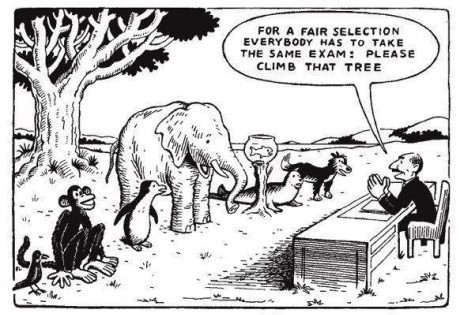
Dyslexia Counselling, Dyspraxia Counselling - Sense Of Isolation Some of us (including those of us with ADHD, autistic tendencies) may feel a bit of a loner, outsider, misunderstood as if no one gets us, that we are missing out on something. Confused, bewildered and frustrated we can feel trapped, impotent at times. We may adopt strategies of avoiding certain things or seeking out others for support (yet resent our dependence on them). The dyslexia counselling & psychotherapy in London recognises that each person's response to dyslexia is different and helps us focus on our strengths, offering psychological & emotional support. We may worry about our social status – struggling to effectively express our feelings and thoughts or form meaningful relationships for a variety of reasons. These may include taking in information and making sense of it, feeling different from others, fearing rejection, struggling to process our thinking, translate what is happening around us. We may feel uncomfortable, isolated or end up isolating ourselves, affecting our self-image. We may struggle to engage in activities or when with others, have a degree of social nervousness. (See also Being Isolated, Separate)
What Counselling For Dyslexia, Counselling For Dyspraxia Offers

The counselling for dyslexia, counselling for dyspraxia explores what we do know (and maybe what we don't know), reconnecting any dots, our responses to any areas of our life that are out of balance, alongside our emotions (any shame we may carry), beliefs, behaviours, and ways we may want to adjust with new structures that work for us in how we think, feel behave, link things up, which make sense to us. Some of us may want to distinguish between what's our personality and what's our dyslexia/dyspraxia. The dyslexia counselling also explores how we can move away from dependence, utilising ways to have more control over our environment, towards independence, being resourceful – tapping into our innate human resources, understanding and focusing on our strengths - what we can do, improving our opportunities, the relationship with ourself and others, exploring what specifically works for us, by:
- Exploring our unique sense of our self & self awareness
- Having an overview, understanding our sense of self, reframing previous experiences - reflecting on our beliefs about ourself, our feelings, and behaviours. Working through the emotional impacts of our "label", "condition"
- Understanding how our fight, flight, freeze mechanism becomes activated and how we can bring this back under our control
- Overcoming, reframing any negative thoughts, feelings we have. Constructively responding to our emotions. Having healthy ways of responding to frustration, anger, any stress, anxiety and distinguishing between what anxieties are just part of everyday living and what are related to dyslexia.
- Addressing unresolved distress (this can include small things like returning items to the same place)
- Developing strategies, coping responses, which enable us to grow, flourish
- Utilising our experiencing, observing self
- Appreciating and addressing the triggers that create our complexities, challenges
- Developing different or positive perceptions, our self-awareness, and emotional intelligence
- Taking care of our wellbeing including our health and dietary needs, exercise, sleep. Being in our body.
- Reframing, challenging our limiting beliefs, mindsets, utilising our imaginative, creative responses
- Having a sense of control, direction, purpose in order to live to our full potential
- Creatively overcoming challenges
- Discovering what supports our, confidence, esteem, self-image and overcoming any "learned helplessness". Building our resilience, self confidence, esteem, being our own advocate
- Utilising our short, long term memory, having helpful tools to remind us
- Having good time management, exploring how we can use our time effectively
- Exploring how we respond to change, transformation
- Unravelling any confusion, having more clarity
- Creating supportive, organised home, work environments boosting effective productivity
- Exploring how we can transform some weaknesses into strengths. Knowing what works for us around key challenges e.g. organisation, remaining focused. Creating and addressing structured strategies to meet different challenges so we grow & flourish, utilise meaningful ways to manage these, including knowing what we're good at and setting up creative environments to support our strengths - honing these, including appreciating, utilising, taking advantage of our gifts, originality, exceptional abilities, passion, energy, diverse thinking, creativity, imagination, determination, strategic thinking, etc. Practising ways of asserting ourselves.
- Exploring the connections we make
- Exploring discernment
- Utilising our senses, intuition
- Having empathy and compassion for ourself
- In our relationships, building rapport, empathy connecting with supportive others, building, experiencing nurturing, accepting environments
- Knowing what we need & asking for what we need, utilising different ways to approach things
- Asserting ourself, especially around asking for what we need
- Exploring how we can put less pressure on ourselves, have peace of mind
- Letting others know about all of who we are, including our dyslexic world, so we are better understood
Dyspraxia Counselling, DCD Therapy - Specific Dyspraxia Experiences
Childhood Experiences Of Dyspraxia Shape sorting toys, including building blocks and jigsaws, may not have come easy to us. We may have not comfortably joined in playground activities and our coordination may have been different (including hopping, jumping, skipping, running, catching or kicking a ball). Tying up shoelaces, doing up buttons, using a knife and fork may have been challenging, as may have getting dressed. We may have tended to bump into objects, drop things, making us appear awkward and clumsy. In class we may have engaged much better one to one than in groups and found it difficult to concentrate on one thing. It may not have come easy to us to pick up new skills without encouragement or repetition to help us learn. Copying text may have been a challenge. These experiences may have been upsetting for us.
Experience Of Dyspraxia Now Dyspraxia therapy is also known as Developmental Coordination Disorder (DCD Therapy). Those of us with dyspraxia may have lifelong experiences of struggling with "fitting in" conventionally – have difficulties with tasks the majority of people take for granted (e.g. household chores, cooking, grooming, maybe driving a car). Some of us may feel disconnected from our physical body, unaware of how to use it - we may have different spatial awareness or feel clumsy, leave a trail behind us. Although there are patterns, our dyspraxic ways are unique to us. We may have a combination of challenges – not all of them applying to us and a range of strengths which counselling for dyspraxia can explore.
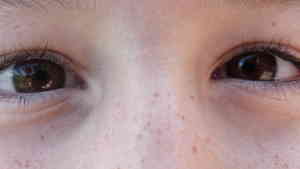
Eye Movements We may tend to lose the place where we are reading. We may struggle with tracking movements without moving our head excessively. Switching our vision from one object to another may not run smoothly.
Speech & Language We may have unclear speech, struggle to pronounce certain words, organise the content and sequence of what we want to say, we may repeat ourself and the pitch, rate and volume of how we speak may differ.


Large Movements (Gross Motor Co-Ordination Skills) Our movements may come across as lacking precision, maybe heavy handed. We may be unstable around our joints, feel floppy, clumsy (including stumbling, tripping, falling, bumping into people, things, have exaggerated arm movements). We may struggle to integrate new movements. Balance, posture, clumsiness integrating the two sides of our body (e.g. catching a ball, clumsy gait and movements, hand-eye coordination) may affect us in sports, jumping, cycling, driving. Lack of rhythm may affect how we dance, exercise. Team sports including catching and hitting balls may be uncoordinated and we may have difficulty changing direction, stopping and starting action. Some of us may have a tendency to fall, trip, or bump into things, people.

Small Movements (Fine Motor Co-Ordination Skills) We may have difficulties with handwriting, typing, drawing, grasping tools, domestic implements. Dressing and grooming ourself may not come easy to us including doing our hair, putting on makeup, fastening clothes, tying shoe laces, shaving. Two handed tasks may be confusing for us e.g. cutlery, cleaning, cooking, playing musical instruments as may using tools, domestic implements, keys and locks. We may have difficulty with typewriting, handwriting, drawing - have poor pen/pencil grip, when writing along a line, or pressing to hard, can be our habit.
Hand Movements Hand dominance may not be established, so we may often use either hand for the same or different tasks at various times.
Our Perceptions - How We Interpret Different Senses We may struggle to be aware of our body position in space, affecting spatial relationships, which for some can result in bumping into people or tripping over things, dropping or spilling things. We may struggle with having a sense of direction, have difficulty distinguishing right from left. Our sense of time, speed, distance and weight may be challenging, e.g. around driving, cooking. Our visual perception may be different, we may be oversensitive to light or noise (find it hard to distinguish sound from background noise). We can be over or under sensitive to touch, resulting in dislike of being touched or strong aversion to over-loose or tight clothing. We may have poor visual perception. We can also be over or under sensitive to smell and taste, temperature and pain. (See also Emotional Sensitivity, Sensory Overload)

Learning, Memory, Thoughts With a low attention span, our thoughts can be scattered. We may be unfocused, erratic, messy, cluttered, struggle with certain instructions (especially more than one) and learning new tasks may not come easy to us if we struggle to instinctively to pick them up. We may have difficulty concentrating, be easily distracted or struggle to complete one thing at a time properly. We may also struggle with copying movements, sounds or writing, so maths, reading, drafting reports accurately may not come easy to us. We may have difficulty in planning, organising our thoughts, especially have a poor short term memory or lapses, struggle with neurological recall, as we forget and lose things (see also Memory, Brain Fog - Choice In What We Are Willing To Forget & What We Are Willing To Remember). Daydreaming or wondering about aimlessly, we may be slow finishing tasks, procrastinate.
Our Emotions, Behaviour We may have a tendency to be erratic, have good and bad days and tend to get stressed, depressed, easily anxious or prone to low self-esteem, emotional outbursts, obsessions, compulsions, addictive behaviour. We may be slow to adapt to new or unpredictable situations, maybe avoiding them altogether, opting out of things that are too difficult (see also Changes & Transitions - Counselling London). Especially in large groups we may have difficulty listening to people, struggle with teamwork (some can be tactless, frequently interrupting). Picking up non-verbal signals, judging tone or pitch of voices in us and others may not come easy to us. We may take things quite literally, maybe listening but not understanding. We may tend to be impulsive, become easily frustrated, wanting immediate gratification.
Counselling For ADHD, Counselling For ADD - Familiar Experiences
The Label Of ADD/ADHD All of us become anxious from time to time (or be on the edge of panic) and can be hyper-busy, hyper-active, distracted. And the medical or psychological term for this excess is ADHD (or ADD). Therefore, some people use the search term "ADHD Counselling", or "ADD Counselling". Yet within the abbreviation "ADHD counselling" is the term "disorder", which is most unhelpful, as if there is something "wrong" with us. The ADHD counselling does not view we are wrong or disordered in some way and each person has slightly different responses, "symptoms", yet there are some commonalities.

ADHD/ADD In Childhood As a child we may have been easily distracted, struggled to concentrate, focus. A sense of fuzziness, going numb and daydreaming may have been familiar to us. We may have been labelled "lazy" or "naughty". We may have felt rejected, misunderstood. When younger some of us may have shut down our emotions (maybe through trauma). As children some of us may have incessantly talked a lot. We may or may not have been taught communication skills (e.g. how we get into conversations, stay in them, exit them), how to reduce distractions, delay gratifications (which can be linked to unwanted habits, unhelpful distractions and addictions now). We may not have been shown helpful tips like using a timer to help us remain on task (though setting it too far in advance may not work, as we can become distracted), maybe dividing our tasks into chunks - easier manageable steps for the appropriate length of time to hold our attention. Planning, organising or problem-solving skills, using, and maintaining a diary/calendar system, utilising notebooks with task lists and action plans for things that overwhelm us may not have been taught or understood. Confidence building, impulse control and emotional resilience may have been missing, affecting our esteem, self-worth, limiting beliefs. We may not have been shown how to overcome self-criticism, frustration, anger, how to healthily release stress, or be assertive without being aggressive. We may also have needed help around procrastination, not always leaving things to the last minute, or having healthy responses to what happens when we feel low. We may have felt slightly out of sync with society and this sense may persist now. (See also Childhood And Ongoing Experience of Dyslexia, Dyspraxia (maybe ADHD, Autism))

ADD or ADHD counselling acknowledges our neurodivergence, our positive aspects, range of strengths and explores what areas of our life are out of balance and need integration (when at times we may feel stable and other times very unstable) how we can filter, manage our senses, energy, especially if we are highly sensitive. Our attention span may be narrow and/or we may also be hyperactive, impulsive. (For some of us, there may be a patterns of over-stimulation, leading to overwhelment, leading to reaction.)
Symptoms Of Inattention, Hyperactivity & Impulsivity
Symptoms Of Inattention may include:
- Often doesn't listen, or disassociates, when directly spoken to
- Often struggles or fails to give close attention to details, making mistakes
- Often have difficulty paying attention in activities or tasks, because we're very eager to move on
- Often dislikes, avoids or is reluctant to engage in tasks requiring sustained mental effort
- Often doesn't follow through instructions, fails to complete workplace tasks
- Often has difficulties organising tasks & activities
- Often loses things necessary for tasks & activities
- Drawn into things, can be easily distracted by irrelevant or external stimulus
- Often forgetful in daily activities
Experiences Of Inattention Maybe disconnected from our internal structure, we in some ways can have extraordinary attention, yet a lot of the time find it hard to give our attention to anything over a long period of time, affecting our self-esteem. We may become easily distracted, often by noise (ear loops can assist), finding it hard to stay on track, become confused, forgetful, maybe absent minded, quickly bored (especially if there is too much predictability, consistency). Some may have difficulty planning or paying attention to detail. Others may get lost in repetitive tasks (e.g. gaming, which for a while at least can give us a different structure, yet can become addictive), have a tendency to daydream. We may experience paralysis, go numb, watch ourself from afar, freeze. Like an itch, we may distract ourself and our attention may wander, have so many ideas spinning around in our head, as our mind goes off somewhere (see also Wandering Mind, Monkey Mind), and we may have difficulties focusing, concentrating, seeing things through. (Some of us may be hyper-focused, hyper-fixated, so absorbed in one task at the cost of all others as we lose track of time, neglect other important aspects of our daily life.)
Symptoms Of Hyperactivity & Impulsivity may include:
- Often talks very quickly, incessantly
- Often blurts out responses before someone has finished what they're saying, interrupting, or intruding on others
- Often fidgets with or taps hands or feet, feeling restless, can't be still for prolonged periods of time, often leaves seats in situations when remaining seated is expected
- As if driven by a motor, often on the go
- Often has difficulty waiting

Experiences Of Hyperactivity, Impulsivity Both a strength and a hindrance at times, we tend to go with the flow, be frequently on the move, doing things where "What's next?" may be our narrative. We may not enjoy sitting still, reflecting and may view slowing down as time wasted, lost. As if the revs inside our internal engine are running super-fast, we may experience a whirlwind of more higher highs, lower lows than most, have sleep problems (this may include going to bed late because of our need for stimulus). And like an over-revved car, it can be as if our brain is busily whirring away at a fast pace. (Using, changing to lower gears can help us avoid crashing. And at other times, taking our foot off the pedal - so we can flow and harness our energy, may help us, whereas for others, putting our foot on the brake pedal - so we take breaks, may be important.) We may be hyper energetic with racing speech, thoughts, and actions. Quick to reaction, stimulus inside of us, we may become excitable, feel out of control at times affecting the environment around us, our home, life, work, social interactions, relationships (see also In A High Maintenance Relationship). Manically busy, often with distractions, we may become easily excited, have knee-jerk reactions, be impulsive, impatient without considering the consequences (e.g. seeking immediate gratification with food, overspending or maybe having other unwanted habits and addictions - especially turning to stimulants, where an alcohol habit may not be conducive despite its initial "feel-good" effects). We may rush tasks without reading instructions, or act before we think, have trouble inhibiting what we say, blurting things out, sometimes making inappropriate comments. We may have poor self-control over our behaviour, acting spontaneously, sometimes recklessly without thinking through the consequences (see also Self-Sabotage, Destruction). Information overload can be an issue for us, as if we have so many tabs open in our brain. In our life, we may hyper-actively go full steam ahead, be frequently restless, maybe agitated or overtalking, over-sharing our thoughts, feelings, as if we have itchy feet, where we are often on the go, multi-tasking, craving stimulus, excitement with a tendency to take risks. (Some of these "symptoms" can be misdiagnosed as anxiety or perimenopause.)
I need excitement, oh, I need it bad.The Undertones
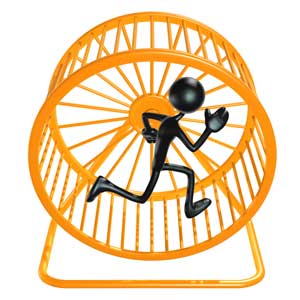
Experience of ADHD/ADD Now In our ADD some of us may not necessarily feel hyperactive - we can be lonely, maybe empty inside, lost in our world of daydreaming, have time management challenges. (And our ADD/ADHD may also be a way we hide any low feelings.) Others may experience both inattention and hyperactivity. Attention "deficit" (maybe more lack of control at times) may also affect our career, financial situation, relationships (e.g. we may mistake intensity for intimacy, emotional connection). Some people may perceive us as irresponsible, with loose, porous boundaries, insensitive, lazy (especially if we burn out), stupid (and we may believe these terms ourself). Despairing at times, we may have spent much of our life feeling alienated, unaccepted, rejected, misunderstood. We can all experience moments of feeling worthless, hopeless, then very positive moments, and with our ADHD the swings can be more pronounced. We may struggle to understand people and they too may struggle to understand us. Characteristics of ADHD/ADD may often include:
- Finding it hard to commit to one thing. Procrastinating, difficulties following things through, struggling to complete tasks, chronic lateness (unless we have pressure to complete things).
- Struggling to bring ideas, thoughts into tangible form
- Having erratic motivation, struggling to consistently remain motivated, e.g. picking up and dropping interests and hobbies
- Tending to temporarily obsess about things, become fixated, overthink, and then move on
- Overwhelmed, overloaded, overstimulated, struggling to switch off
- Bouncing around, with lots of ideas flushing through us. Yet very little done, find it hard to take things forward and run with them
- The sensation of the wheels spinning, yet with the handbrake on
- Experiencing bursts of energy, can't stand still, as if our mind is racing away by itself
- Wearing ourself out, fatigue from the energy output in all our different roles (our energy levels can be great & then we collapse)
- Not resting our body, at other times feel lost, stuck, maybe in a fog, on the spot & need to recoup our energy (for some, this is where unwanted habits, unhelpful distractions & addictions can kick in
- Putting up a wall when mental engagement is called for, or if people think too much (especially if bored)
- Buzzing mind, binging on things to relieve boredom (maybe repress our emotions), yet searching for something
- Having a highly sophisticated mind, yet being childlike/childish at times
- Over-sharing information
- Chasing feelings
- Bewilderment, confusion(including over our, others emotional states)
- Feeling low, depressed
- Tendency to go numb
- Difficulty following rules, meeting deadlines, sticking to routines
- Frequently misplacing or losing things e.g. documents, keys, mobile, wallet, remote controls
- Lacking self-care especially, looking after our health, attending appointments
- Having a fluctuating good & poor diet
- Being, appearing, untidy, cluttered, messy, disorganised, maybe chaotic, scattered, uncontained at times, yet other times being tidy
- Having difficulty planning meals, problems budgeting, spending
- Forgetting what others have said, asked, or needed. Can interrupt or finish others' sentences. Having difficulty listening for long periods, remembering conversations, directions
- Poor memory (as if we frequently have a delete button in our head) maybe missing appointments or forgetting birthdays, our obligations
- Needing a deadline to thrive (yet dislike this). Squeezing things in, frequently late, doing things the last minute, moving, pushing, breaking deadlines, different concept of time.
- Feeling disappointed, embarrassed inside, believing we will never get our life under control
- Having emotional difficulties. Becoming easily flustered, stressed, irritable – maybe with fluctuating mood swings - possibly from elation (even grandiosity) to a sense of inferiority, depression, or we may have a tendency to blow up small problems out of proportion. We may have a hard time managing any feelings (maybe overwhelmed by them) especially powerful emotions like frustration, anger – having quick explosive tempers.
- Oversharing our feelings, thoughts
- Compulsiveness (e.g. following our urges with repetitive behaviour, as if we cannot stop, control this)
- Having low self-esteem, feeling insecure inside with an underlying sense of under achievement, being hypersensitive to criticism
- Become the entertainer, joker
- Being a bit of a night owl
Range Of Strengths, Positive Aspects Of ADHD These may include:
- Passion
- Explosion of thoughts
- Ability to channel our fast thinking
- Can respond & focus under deadlines, under pressure, or at times of crisis, to get things done
- It can be as if a flashlight shines bits of a jigsaw puzzle and our mind see things from different perspectives
- Drive & vigour - being driven to achieve
- Motivation for things of immediate interest
- Risk taking
- Ability to conceptualise on a scale, see a bigger or different picture, not so linear, binary (therefore less restricted to specific goals)
- Ability to see a variety of pathways, options
- Ability to perform a range of complex tasks
- Having different problem-solving approaches, abilities
- Ability to think on our feet
- When unprepared, able to respond in the moment
- Unconventionality
- Innovation, creativity
- Can be hyper-focused
- A range & depth in our sensitivities, senses (see also Emotional Sensitivity, Sensory Overload)
- Some may experience the qualities of an empath

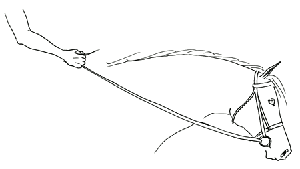
Taking Charge Of Our Life It may be important to us to consciously take the reins of our life, so things don't spiral out of control, utilising our resources as best we can. We may be caught up in our mind with unnecessary thoughts we may want to give our mind space. Being in touch with our own essence, creating a space and quiet time, stillness and reflection that works for us may be supportive (see also Willpower - Finding, Having & Following Our "No" Or "Yes"). The counselling for ADHD/ADD can explore with us who or what is driving our life, and creative ways we can take charge in our life, when we need to and overcoming certain challenges (maybe managing time, regulating our emotions, having empathic responses, so we are less dependent on others to assist with this). In order to be less scattered, the therapy can explore what regular systems, supportive routines, structures, boundaries, disciplines work for us, so they can be part of our life, and at the same time break them when we need to.
Between stimulus and response there is a space. In that space is our power to choose our response.Viktor E. Frankl
In our response lies our growth and our freedom.


Counselling For ADHD, Counselling For ADD Research indicates that ADD/ADHD affects the brain's frontal lobes - controlling memory, impulsiveness, behaviour and self-regulation. Therefore, for some it is understandable that our ADD/ADHD brain frequently seeks stimulation, pleasure, adrenaline and we can have extreme responses in reasonable situations. (And if tasks don't produce a "dopamine hit", we can quickly lose interest.) The counselling for ADD recognises that each person's response to ADD/ADHD is different and helps us focus on our strengths, utilising an internal tool bag of responses, so we don't abandon ourself (or others). We may want to explore what approaches work for us (e.g. discernment, filtering out things). Alongside looking at ways to respond to, or reduce, any anxiety, and to enable adrenaline rushes to be more sustainable, some of us may also want to feel more calm, confident, boost our esteem, overcome any frustration, anger, shame, guilt, change any unhelpful self-beliefs (e.g. we are lazy). Yet at times we know that we can only get started on what feels engaging to us at the time. The therapy for ADHD therefore explores ways we can adapt. We may also now want to learn key skills we may not have been taught in childhood, so we are more resourceful, confident and self-assured in our right to be ourself. Breaking down tasks into manageable chunks, discovering how we prioritise, best prepare and plan for things may be important (though loosely enough, so it gives us flexibility, so they are not so tight or complete in our head, which may put us off). Unravelling any confusion, having more organisational skills (e.g. listing reminders for simple daily tasks, which keep us on track, putting things in a regular place or leaving things in our physical path acting as memory joggers) may matter to us (it may also help to write important things, reminders, down). For some, clarity and strategies to focus, concentrate, may be useful. We may also want to establish rituals for bringing ourself back when we go off on tangent. (Other rituals may be about getting into a habit of returning items to a familiar place - because our external environment affects the internal.) Taking on too much at times, we may also want to have gaps, pauses, between tasks, utilising time-management skills, including creating time - a bit of space when we need to (especially if we're time-blind - not sensing where we are in time, where we don't put deadlines onto things, unless there is a problem). We may be prone to doing things the last minute, which can give us an adrenaline buzz. Being present in the moment to ourself in order to be present to others and how we manage our time can also be explored in the ADD/ADHD therapy. This may include accepting the times we can't focus and just getting on with other things. Wanting to flow easier in life, we may deep inside know we need structures yet fear them. And we may want to explore how to structure and organise ourself mentally, practically (e.g. setting a pre-programmed snooze reminder on our alarms a few minutes before we need to do a task, colour-coding files, folders, allocating, blocking time for tasks, mapping tasks and work in our colour-coded diary, allowing for "cushions" for things to take longer). Exploring what ways emotionally work for us can be a part of the therapy for ADHD (see also Healthy Ways To Regulate Our Feelings, Emotions). This may include noticing what gives us momentum, so we also see things through, allowing for rest periods and the therapy for ADHD may support us in this. We may want to explore our capacity to think, concentrate, fully listen, reflect, utilise our boundaries, and express, yet sometimes contain the fire of our passion (and at times any unnecessary risk taking) when we need to, so the strength of our ADD/ADHD enhances us and doesn't spill out in unhelpful ways. (We also don't have to speak all our thoughts, over-explain things, which can be experienced as floodlighting, disconnecting others.) The counselling for ADHD explores both what we know and may not know. Sometimes making little practical adjustments can support us (e.g. being aware of our triggers, building routines that work for us, taking small pauses between each task (the space between stimulus and response), or keeping a distraction diary, writing down our distractions rather than acting upon them). If we are addicted to our mobile phone, a good blocker may be useful. It may also be important to be aware of the difference between what arouses us from the outside and within us. (Our level of caffeine or sugar consumption may not help for some, whereas having proper sleep habits may benefit others.) Sometimes we just need to be held, supported either by another, and also find ways to hold, support our self, so we feel secure, more in control, maybe more stable (some people have found that the containment of a weighted blanket or grounding sheet can physically, psychologically support us, whereas others have been helped by getting our thyroids checked out). Others find that physically moving our body supports us in thinking things through, so we are more able to reflect. We may also want to explore tuning into what our body is telling us, learn to self-soothe, and connect to our purpose, which can help refocus us. (Being out in nature can be beneficial for some.) The therapy for ADD/ADHD counselling can also explore impulse control and having fun without necessarily being impulsive, as we don't have to stop being playful to be responsible. We may want to practise our inner discipline, self-care (especially if we are accident prone, bruise a lot), alongside how we gain perspective, simplify things, manage our new ideas, monkey mind, energy. What gives us peace of mind, so we don't fight with ourselves and how we can settle down in life more (if that is our need) can be explored in the ADHD therapy, as can our perceptions of our and others' emotional states. Having a strong sense of self, pride in our identity, being anchored, grounded in our body, coming from a self-structure, as best we can may also be important for us, as may letting others know about all of who we are, educating them about our ADHD world, so they are aware of this, understand us more. (We may also need insight into the effect of our behaviour on others or maybe towards setting realistic goals.) We may want to understand how our personality is shaped by the interplay of our neurobiology alongside environmental factors and manage fluctuations between being extremely focused and unfocused (because although we acknowledge that routine can give us structure, we may also avoid routines, if we struggle with constant focus, where our all-or-nothing thinking may kick in). Putting our critical thoughts into perspective may be important. It can be as if the energy in us must be expended. The therapy for ADHD explores the lost bit in the middle, so it's expressed in ways which work for us, where little disciplines, volition, witnessing, healthy distractions, alongside exercise, choosing to act as opposed to re-acting, utilising calm, quiet spaces when we need to, may assist us (see also Resting, Recuperating, Recovering & Pacing), as may letting people know at the time when we are feeling a bit overwhelmed. We may want to organise our life better, find ways to ensure we do important tasks, practise limiting distractions (by creating an environment that minimises these, e.g. dedicating a conducive workspace, turning off non-essential notifications, eliminating multitasking when possible, so we solely focus on one, specific task at a time, setting specific times for breaks - maybe using a timer). We may want to have more control over our impulses, decisions, developing patience, simplifying things, establishing supportive, repetitious routines in life, building, maintaining and scheduling supportive habits, practising self-control, having emotional regulation, flexible thinking, decision making and plan resources. We may want to organise things, focus, utilise our, working memory and to support our "executive functions" (see also Reclaiming Our Own Ground - Our Inner Stability). If we are a visual learner, we may need to utilise visual aids and if we prefer a more auditory approach - we may want to listen to podcasts, playing certain music, etc. Self-monitoring, self-reflection, mindful meditation, rewarding ourself, playing ambient music to soothe us may also be areas we can practise and improve. In summary, we may want to practise reminding ourselves of certain supportive actions, including:
- Looking after our body in terms of diet, sleep, exercise
- Structuring our day (including allowing for periods to relax & discovering certain activities that support this, e.g. martial arts, ballet, yoga, walking)
- Planning difficult meetings or conversations, anticipating possible challenges, envisioning our desired outcome
- Discovering, practising specific structures, certain disciplines, which work for us
- Prioritising what's important, urgent
- Breaking down big goals into smaller, manageable tasks
- Responding to boring tasks quickly
- Finding ways to help ourselves concentrate, focus (this may include silence, background music, something to fiddle with in our hands)
- Writing down plans
- Making lists & notes
- Using colour-coding & reminders
- Accepting that some things are just difficult
- Learning to tolerate our moods (without catastrophising, or panicking)
- Being compassionate, willing to learn if things don't go our way
- Having time outs, blow at times (e.g. gym, dancing, running)
- Validating, rewarding ourself when things go well
- Asking for help in specific ways from family and friends
- Spending time with supportive others
- Choosing to tell people of our ADHD, yet not using it as an "excuse"
- Getting feedback about how we affect others & asking for feedback when we do things well
Autism Counselling, Autistic Therapy

Autistic Counselling, Therapy For Autism Each of us have a different type of autistic experience - some of which are familiar to other autistic people. Autism is just the way some of us have a different sensory and cognitive style, including the way we understand things. It is a complex experience - a lifelong experience said to affect 1 - 2.2% of the population (ADHD, OCD can sometimes be more prevalent) and can impact on the way we see and interact with the environment and others around us. Enjoying rationalising, we may just not "get" the neurotypical world at times or get confused when things can't be rationalised, without a sense of flow. Some of us may carry shame for being different, or be shamed when we were younger - maybe compounded by the unhelpful word "Disorder" in the label ADH"D". (Some people are medically labelled with ASC - Autistic Spectrum Disorder (ASD), Pervasive Development Disorder - not otherwise specified PDD - NOS.) We may struggle with verbal and non-verbal communication, social interactions, find it difficult to engage in the world around us or may become isolated in groups, uninvolved (see also Social Anxiety Or Social Phobia). New people, situations can be particularly stressful for some of us. Our autism is on a spectrum and carries our own unique blend of strengths and challenges. Many of life’s contributors, achievers, great minds throughout history, have been considered to be on the autistic spectrum. We may have such qualities as intelligence: enjoy knowledge and learning, have good practical or technical skills, be honest, kind, gentle, and courteous, straight-forward, have good sense of humour, be child-like and playful and dedicated in a relationship (yet maybe unwilling to end dysfunctional relationships). Counselling for autism can be offered for areas in our life we want to talk about, including what may be happening inside our head, body.

Social Masking Masking is the way we consciously camouflage and hide anything not mainstream or unusual, when we copy the behaviour and mannerisms of the mainstream (or neurotypical) through learning society's unwritten rules, what's "appropriate" - those which seem automatic for others, yet not for us. Masking can come from our love or fear (e.g. of rejection), with different results (to avoid being rejected we may increase our masking). An example of social masking may be learning to give more eye contact than we would naturally like. Connecting socially with others, being socially motivated, especially for girls and women, can be important. Therefore, for some women or men who in interactions have learnt social skills, our autistic "symptoms" may sometimes be hard to spot if we have compensated by socially masking our "autistic self" by learning behaviours to get by, connect with others, creating an outward neurotypical "front" to fit in. Not wanting to be seen as weird, different, we can become a mimic which can feel unnatural. Yet it can be extremely draining, stress-inducing (taking up so much concentration), forever trying to mirror others and fit in, where we can end up also feeling like a fraud, fake, or as if we have impostor syndrome. We may try to be someone we are not. Yet, when things get too much, we may become silent, as a way of responding (and we may need to let others know that we don't need fixing). We may need to find some quiet time, especially if things get overwhelming. It may mean that we just can't express our emotions instantly, can't always respond in time to things. We may try to hide our fuzzy feelings, shutdowns, meltdowns when our mind becomes frazzled. We may learn to hide any stigmatising behaviour. The therapy for social masking may also explore what we gave up in order to belong. Being hyper-vigilant without acting "normally" always relying on masking, conforming, or following other's ways and opinions can be very tiring, maybe leading to burn-out. It can be challenging, yet rewarding, for us to articulate to others our autistic world, so we can be more ourself - the true "me", be real, more natural, authentic.
Our Experiences We may want to use the autism therapy to talk about the themes, experiences in our life:
Our self
- Because our brain is wired differently – our neurodivergence, the way we process information is quite different to neuro-typical people
- As a child, had a vivid imagination
- Experiencing rules can be challenging both as a child and adult (and resisting being told to do things)
- Blaming ourselves if we receive negative reactions from others
- A history or problems at school/college, maybe our stress, anxiety, attention span, organisation skills, communication, difficulties getting on with students/ tutors or being teased, bullied, maybe feeling isolated - we may also make ourself isolated (with similar experiences to those of us who are dyslexic), depressed, aggressive, angry, have sleep or eating problems
- Finding it difficult to get on with our peers, bosses or find satisfactory employment, stay in work
- Procrastinating, difficulties following things through, struggling to complete tasks, chronic lateness
- We may have difficulty making decisions, taking responsibility
- May prefer non-fiction books
- May over-think, have a hunger for lots of information - the more, the better (yet we can also experience information overload, when things become a blur)
- Fascination with complex systems
- Enjoy getting very immersed in our special interests which can take hours, days (this also can allow our brains to process information overload and get back in control)
- High tendency to become strongly absorbed in something – with emotional reactions when anything/someone takes us out of what we are doing - stopping our flow, or interrupts and difficulty resuming things
- Focusing on tasks that have an end goal, are easier to achieve, yet struggling to focus on open-ended, nebulous tasks, that have no sense of completion
- May tend to obsess about things (which can take our eye off the ball in paying attention to other important things in our life)
- A sense of playing catch-up
- A different sense of time & space, losing a sense of time
- Valuing our independence, consistent preference for doing things on our own
- Having our own space, alone time is especially important to us & on the face of it be self-sufficient
- We may notice our energy levels being lower than most
- Confusion of feelings, unsure what we are feeling
- Oblivious to things around us (or very aware)
- Doing things the same way all the time and if routines are changed this can be disturbing and we can feel out of control, doing the same things most of the time. Enjoying the familiar, we may have a tendency for repetition – maybe what we say or do e.g. playing music on repeat. (We may not only enjoy the rhythms of music, but also art, poetry.)
- Adopt repetitive movements, mannerisms. May soothe ourself to help overcome external stimulus or our moods by stimming (often experienced as relaxing, pleasurable) - self-stimulating behaviours, rhythmic, repetitive sensory activities, e.g. making sounds, staring at stimulating objects, twirling our hair, flicking our fingers, stroking textures, rubbing or scratching our skin, tapping our fingers, feet, rocking back and forth, flopping our arms or hands, turning radios or lights on and off. This can help regulate our nervous system, calm us down, gain a sense of control, ease our boredom, anxiety, frustrating feelings, help us concentrate.
- Need for things to be balanced. Restrictive, prohibitive behaviours - a need to adhere to patterns.
- Noticing sequences in things (maybe enjoying arranging things in rows, patterns)
- Noticing things in visual environments, familiar settings/rooms, that have changed
- Insisting on redoing things until they are just right
- Unfamiliar atmospheres can be experienced as chaotic
- May become stressed if all our "to do list" boxes aren't ticked
- Can become impatient when we have to wait
- Tendency to carefully plan activities
- Sensory sensitivity or overload at times, influencing us to react, or go numb
- Lots of stimulus can overwhelm us, as if our mind frazzles, short-circuits
- Impulsivity where we can become stimulated by the immediate, responding, reacting without reflection
- Uncomfortable being in enclosed spaces, large crowds
Our self with others
- Difficulty talking in groups of people, yet more interested in finding out about things than people
- May have difficulty maintaining relationships
- Concerned to say "the wrong" thing
- Intense fear of being rejected
- Seeing things others don't see. Others seeing things we don't see. Can also get things quickly where others struggle & others can get things quicker when we struggle.
- Finding it difficult to invest in, make and maintain close friendships, or feel a sense of belonging
- Difficulty in maintaining eye contact, or being on the receiving end - experiencing it as intrusive
- May struggle to recognise even familiar faces yet notice very small changes in people’s appearance
- Working out what's appropriate, how to be in certain situations, what's our role, maybe feel confused, puzzled, with how to be, or the signals others give off (e.g. people's strength of feeling, puzzled over what's very important, or just a fleeting joke). We may struggle with certain nuances, social cues, reading people's faces, body language, making conversation, small talk (where our mind goes blank).
- Can struggle with reading other people’s perspectives, reactions and having the right emotional response to something which can be anxiety provoking in us (and we may be considered selfish or uncaring)
- Finding it hard to guess what other people are thinking and feeling, or have empathy, wondering why they are laughing at a joke
- Can be thrown by the spontaneity of others, including when we are asked questions that seem to come from nowhere, or feel put on the spot, a sense of paralysis, or go numb, if we just don't know the right answer
- When making attempts to be polite or logical, we may come across as distant, be perceived as critical, rude
- May feel uncomfortable when meeting new people, anxious in new social situations, or can feel distressed when interacting with others, especially new people
- Wondering what to do with our body
- Not feel like showing emotions, preferring to distance ourself
- Sensitive to being pressurised, either caving in, or digging our heels in
- Making great effort in being understood, reframing the way things are in our head so we hope others will understand us, get us
- Obsessed with accuracy in communication – importance in finding the right words without ambiguity, yet difficulty finding the right words, saying what's appropriate
- If we are not accepted and understood this can affect our confidence, self-esteem and self-worth
- Tendency to repeat things, talk about things that fascinate, preoccupy us
- Using our logical minds, we can become confused when people behave in illogical ways, or don't use literal language, or do not say what they mean or mean what they say (see also Impact Of Language, What We Say, The Words We Use)
- When people lie (or do not tell the whole truth ) we may become confused or angry
- People's inconsistencies confuse us
- Need for clarity, not ambiguity.
- What is right, fairness and truth can be obsessively important to us, with a strong sense of correctness, justice where the perpetrator gets punished
- Sense of impotence to change things, powerless
- Puzzled, we may struggle to put a voice to our feelings and either shut down or feel angry
- May feel awkward, or not enjoy touch, physical intimacy
Our Strengths May Include:
- Good memory
- High attention to detail
- Honest & direct communication
- Caring, willing to help others
- Thriving on routine
- Creative
- Storytelling
- Good at problem solving
- Enthusiastic
- Good sense of humour
- Can see the bigger picture
Autistic Therapy, Therapy For Autism In the autism counselling, my role is to listen and hear you, try to understand you. We are all wired differently not always in neurotypical ways. Therefore, each person's response to being autistic is different so there is no one model to suit our individual needs and the therapy for Autism focuses on our strengths. (Some of us may want to distinguish between what's our personality and what's simply being autistic.) And for those of us who wonder if we have the label "autistic", the autism counselling aims to be clear and concise with communication and explores what connects us, alongside what doesn't in the ways the neurotypical world does things. My role is to provide a pleasant, safe, secure space, get to know you and find out what you might need, maybe things you haven't considered (see also Role Of The Unconscious - "The Yet To Be Revealed"), so you are more resourceful, alongside finding out how you personally make sense of the world, process information, relate and interact with others, so I can support your emotional health and wellbeing. For some, we may need support or tools in managing stress, anxiety at times, maybe with our confidence, esteem or assertiveness. So, the therapy for autism includes exploring together what structures help in our responses to what stresses us - when we become overwhelmed, confused (maybe feel chaotic inside), pressurised, upset. Others may need a more targeted support (maybe wanting things spelled out to us in a more coaching role), so we maximise sustainable structures, feeling more in control, maybe more stable, so we feel less overwhelmed, especially in new or puzzling situations, have coping responses and routines that work for us, utilising our gifts and strengths. (For some this may include acknowledging our emotions and also regulating them.) My role may also include exploring your sensory needs, asking questions, offering some coaching, teaching organisational skills. Also, the counselling for autism can support us in working practically and visually, with diagrams, flowcharts, mind mapping and maybe exploring timetables, or written instructions. We may explore your attention span and the differences between concrete and imaginative thinking. In relating with others, practising communication skills, social skills in role plays can be offered. This may include our affiliation skills - how we read people and their body language, get into conversations, stay in conversations, exit conversations, being socially responsive (e.g. returning smiles, practising compliments, maybe showing empathy as best we can). We may also explore what builds, breaks trust in friendships, tuning into our attachment and bonding needs (see also Our First Relationship - Early Connections & Bonding Patterns) - how much closeness and space we need and time to find somewhere quiet to sit. Some of us may be caught up in our mind with unnecessary thoughts we may want to give our mind space. Our autistic ways may at times feel or be socially isolating at times, and we may want to find the strength to step out into the world, show and let people know our autistic world and all of who we are, educating them about our autistic self, so they see the whole of us, so we are more able to feel safe, secure, flourish, have a sense of belonging. These are areas some people may want to address:
- Having more clarity, unravelling any confusion. How we could manage any confusion including how we think, how our brain works, what happens when we generalise or have over-rigid beliefs and the idea of choice in different contexts.
- Self-awareness – to get to know ourself, our personality, understand how others might see us, inferences and how our actions affect others. Communication strategies and picking up signals including the difference between sympathy – wanting to help others, and empathy – interpreting others emotional states and imagining or feeling the same emotion in ourselves (this will also help us in all sorts of relationships)
- What connects us, disconnects us
- Advantages & disadvantages of daydreaming (see also Frozen In Time, Locked, Trapped, Fixated Only In The Present Moment, Accompanying Ourselves "In The Moment" With Awareness, Presence, Imagination, Reflection)
- Self-trust, taking charge of sense of safety (especially if we base it externally)
- Understanding and managing stress, fear, anxiety
- Understanding and managing our fight flight freeze responses
- Stimming alternatives, exploration of our emotions, needs that trigger them
- Unpacking our own thoughts/beliefs, being curious about these
- Distinguishing between what's factual, what isn't
- Getting to know our own decision-making processes, making decisions
- Being in touch with, utilising our senses, befriending them, exploring slow graduated exposure to challenging ones and consider alternative strategies for responding to our senses, so if things get too much, we can avoid sensory overload
- Listening to our body, breathing, exploration of our gut feelings, instinct, and intuition to support the way we socially communicate, so we do not have to guess so much
- Exploring what grounds us
- Exploring our adventurous, risk taking side
- Exploration of what enlivens us, deadens us
- Exploration of our identity, roles we take on
- Compassionately acknowledging our fallibility
- Having some supportive mantras
- Being with supportive others who "get" us
- Confidently embracing, utilising our resources, asserting ourself
- Exploring, expressing our light-heartedness, playfulness, carefreeness, laughter, fun & our sense of humour
- To know how/when to filter what we say and do
- To pace ourselves when we need to
- To have a strong sense of self & pride in our identity
- To connect to our purpose, deeper meaning, set our intentions, goals
- Utilising quiet, calm spaces when we need to, knowing what soothes us
- Letting others know more about our autistic self, so it's less hidden & we can be understood
- In social situations, the therapy may help us recognise why group situations and social events might be taxing for us, to recognise our triggers and develop practical strategies how best we can respond to them (e.g. excuse ourselves to get some air or use the bathroom giving us some respite.). And when people are not honest, straight-forward (or don’t tell the whole truth ) this may confuse us, we may need help in understanding that speaking our honest truth is very important, yet occasionally not always the best thing to speak (see also Tactful & Truthful Approach) all our truth in every situation. We may want to explore steps to make friends and develop friendships, express intense emotions
- In relationship, having ways to develop connection, remain in touch, regularly interact
- In relationships, how to avoid emotional meltdown, when things get too much
- In relationships, depending on our own circumstances reviewing subtle steps how to develop close relationships from the beginning, from getting to know what’s appropriate, innuendo (and what might be embarrassing for us and others), our and other’s emotions, needs, through to eye contact, a bit of flirting, touch, more intense emotions, and enjoy sexual intimacy
Questions About Dyslexia, Dyspraxia, ADHD, Autism
Questions About Dyslexia Counselling We may have certain questions about counselling for dyslexia:
- What is dyslexia counselling?
- How to overcome dyslexia problems?
- I have dyslexia with numbers, a maths dyslexia, numerical dyslexia, verbal dyslexia - what can I do?
- How to cope with dyslexia?
- What is the treatment for dyslexia?
- Is there a dyslexia treatment?
- Dyslexia help - can I get help for dyslexia?
- How can I get help for dyslexia problems?
- What is dyslexia support?
- Can I get support for dyslexia?
- What dyslexia therapy is available
- Can counselling for dyslexia help?
- What is dyslexia therapy?
Questions About Dyspraxia Counselling We may have certain questions about counselling for dyspraxia:
- What is dyspraxia counselling?
- How to overcome dyspraxia problems?
- I have dyspraxia with numbers, a math dyspraxia, numerical dyspraxia, verbal dyspraxia - what can I do?
- How to cope with dyspraxia?
- What is the treatment for dyspraxia?
- Is there a dyspraxia treatment?
- dyspraxia help - can I get help for dyspraxia?
- How can I get help for dyspraxia problems?
- What is dyspraxia support?
- Can I get support for dyspraxia?
- What dyspraxia therapy is available
- Can counselling for dyspraxia help?
- What is dyspraxia therapy?
Questions About ADHD Counselling We may have certain questions about counselling for ADHD:
- What is ADHD counselling?
- How to overcome ADHD problems?
- I have ADHD with numbers, a math ADHD, numerical ADHD, verbal ADHD - what can I do?
- How to cope with ADHD?
- What is the treatment for ADHD?
- Is there a ADHD treatment?
- ADHD help - can I get help for ADHD?
- How can I get help for ADHD problems?
- What is ADHD support?
- Can I get support for ADHD?
- What ADHD therapy is available
- Can counselling for ADHD help?
- What is ADHD therapy?
Questions About Autism Counselling We may have certain questions about counselling for autism:
- How effective is autistic counselling?
- Is autistic counselling helpful?
- What is autistic therapy?
- How effective is autistic therapy?
- What is autism counselling?
- How to overcome autism problems?
- How to cope with autism?
- What is the treatment for autism?
- Is there a autism treatment?
- Autism help - can I get help for autism?
- How can I get help for autism problems?
- What is autism support?
- Can I get support for autism?
- What autism therapy is available
- Can counselling for autism help?
- What is autism therapy?
FAQs about the dyslexia Counselling London practice based in Kings Cross, Camden:
- What is the frequency of dyslexia counselling in London, Kings Cross?
- How many dyslexia counselling in London sessions do I need?
- How much does dyslexia counselling London cost?
- How effective is developmental coordination therapy?
- How long does DCD therapy take?
- Must I visit your London counselling for dyslexia in Camden or do you offer Skype counselling, online counselling or Telephone counselling?
- What are the advantages and disadvantages of offering online counselling, Skype counselling or in-person counselling in London, Camden, Kings Cross
- Do you only offer dyslexia counselling in London, Camden or Kings Cross?
- What times do you offer dyslexia counselling in London, Kings Cross or Camden?
- How do I contact a counsellor in London, Camden, or near Kings Cross?
- How effective is dyslexia counselling in London, Kings Cross, Camden?
- What can I expect from the initial session of dyslexia counselling London?
- What to expect from the other dyslexia counselling London sessions?
- What is the typical duration of the London counselling for dyslexia in Camden, Kings Cross
